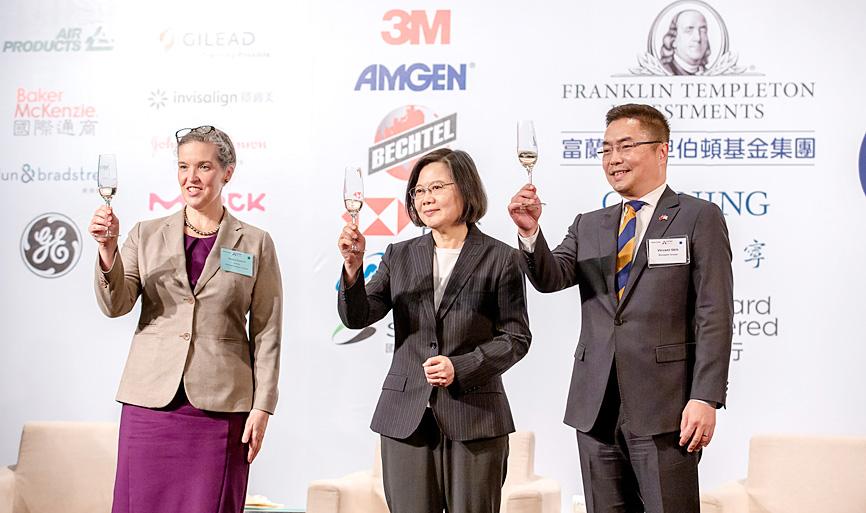Enhancing Taiwan’s role as “a regional security partner” and promoting global supply chain resilience are among the top priorities of the American Institute in Taiwan (AIT) in the second year of US President Joe Biden’s presidency, AIT Director Sandra Oudkirk said on Wednesday evening.
Speaking at the annual Hsieh Nien Fan (謝年飯) banquet hosted by the American Chamber of Commerce in Taiwan, Oudkirk said that the US-China relationship is facing challenges in areas such as trade and human rights, while the US is also concerned about Beijing’s ties with Moscow, especially after Russia’s invasion of Ukraine.
In the Indo-Pacific region, China’s aggressive behavior is especially obvious in Taiwan, where Beijing continues to exert military, diplomatic and economic pressure, she said.

Photo: CNA
China continues to “choke Taiwan’s international space, pressure its friends and interfere in Taiwan’s democratic system,” which poses a threat to all democratic countries, she said.
China’s provocative military activities near Taiwan are disrupting stability and peace in the region, she added.
To counter China’s actions, the US would continue “standing with allies and partners to advance our shared prosperity, security and values in the region,” which is at the core of Biden’s foreign policy, Oudkirk said before discussing the AIT’s objectives.
First, the US would continue to assist Taiwan in enhancing its defensive capabilities to improve “Taiwan’s role as a regional security partner,” as stability across the Taiwan Strait is key to regional peace and in the US’ interests, she said.
The US is “deeply concerned by ongoing PRC [People’s Republic of China] efforts to undermine that stability,” she added.
Second, the US would work with Taiwan to bolster global supply chain resilience through a series of initiatives, as Taiwan is at the center of the semiconductor supply chain, and a pioneer in 5G technology and artificial intelligence, Oudkirk said.
Taiwan would play a crucial role in the recovery of supply chains affected by the COVID-19 pandemic, she added.
The US is to use the Technology Trade and Investment Collaboration framework to encourage investment in semiconductors, electric vehicles, cybersecurity, renewable energy and energy storage from both sides, she said.
The AIT this summer is to form trade delegations to visit the US to discuss the framework, which would help “build scalable eco-systems and enhance collaboration between and among companies, research institutions and innovation centers,” she added.
Third, the US would keep “supporting efforts to preserve and expand Taiwan’s international space,” offering more opportunities for Taiwan to share its expertise at multilateral forums and interact with international partners, she said.
The institute would also strive to deepen “economic and people-to-people ties” between the US and Taiwan in high-tech fields and beyond, she said.
Taiwan was the sixth-largest consumer of US agricultural products and the US’ eighth-largest trade partner in goods last year, with per capita trade only behind Canada and Mexico, she said.
Last year, the US and Taiwan relaunched Trade and Investment Framework Agreement talks and held the second Economic Prosperity Partnership Dialogue, which would promote economic cooperation between the nations and help “build a coalition to counter the PRC’s unfair economic and investment policies,” she added.

A magnitude 5.6 earthquake struck off the coast of Yilan County at 12:37pm today, with clear shaking felt across much of northern Taiwan. There were no immediate reports of damage. The epicenter of the quake was 16.9km east-southeast of Yilan County Hall offshore at a depth of 66.8km, Central Weather Administration (CWA) data showed. The maximum intensity registered at a 4 in Yilan County’s Nanao Township (南澳) on Taiwan’s seven-tier scale. Other parts of Yilan, as well as certain areas of Hualien County, Taipei, New Taipei City, Taoyuan, Hsinchu County, Taichung and Miaoli County, recorded intensities of 3. Residents of Yilan County and Taipei received

Taiwan has secured another breakthrough in fruit exports, with jujubes, dragon fruit and lychees approved for shipment to the EU, the Ministry of Agriculture said yesterday. The Animal and Plant Health Inspection Agency on Thursday received formal notification of the approval from the EU, the ministry said, adding that the decision was expected to expand Taiwanese fruit producers’ access to high-end European markets. Taiwan exported 126 tonnes of lychees last year, valued at US$1.48 million, with Japan accounting for 102 tonnes. Other export destinations included New Zealand, Hong Kong, the US and Australia, ministry data showed. Jujube exports totaled 103 tonnes, valued at

TRUST: The KMT said it respected the US’ timing and considerations, and hoped it would continue to honor its commitments to helping Taiwan bolster its defenses and deterrence US President Donald Trump is delaying a multibillion-dollar arms sale to Taiwan to ensure his visit to Beijing is successful, a New York Times report said. The weapons sales package has stalled in the US Department of State, the report said, citing US officials it did not identify. The White House has told agencies not to push forward ahead of Trump’s meeting with Chinese President Xi Jinping (習近平), it said. The two last month held a phone call to discuss trade and geopolitical flashpoints ahead of the summit. Xi raised the Taiwan issue and urged the US to handle arms sales to

BIG SPENDERS: Foreign investors bought the most Taiwan equities since 2005, signaling confidence that an AI boom would continue to benefit chipmakers Taiwan Semiconductor Manufacturing Co’s (TSMC, 台積電) market capitalization swelled to US$2 trillion for the first time following a 4.25 percent rally in its American depositary receipts (ADR) overnight, putting the world’s biggest contract chipmaker sixth on the list of the world’s biggest companies by market capitalization, just behind Amazon.com Inc. The site CompaniesMarketcap.com ranked TSMC ahead of Saudi Aramco and Meta Platforms Inc. The Taiwanese company’s ADRs on Tuesday surged to US$385.75 on the New York Stock Exchange, as strong demand for artificial intelligence (AI) applications led to chip supply constraints and boost revenue growth to record-breaking levels. Each TSMC ADR represents